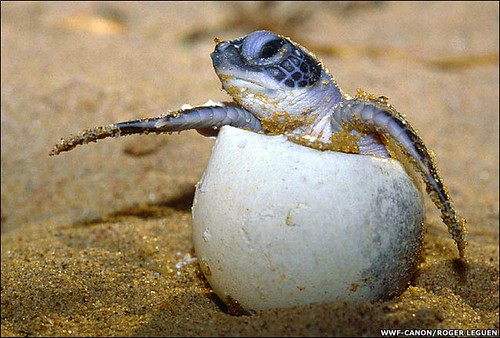tags: sea turtle, Olive-Ridley hatchling, Image of the Day
An Olive Ridley hatchling struggles out of its egg on a French Guianan beach. Egg collection and snaring in fishing nets have brought the turtle's population down by 95% in 40 years. Turtle protection has been under discussion at the Convention on International Trade in Endangered Species meeting.
Image: Roger Leguen, WWF [larger]


This poor little guy should still be snug underground in the nest at this point!
Worked with Kemps ridley one year with my Girl Scout troup. Guess I will have to blog about that sometime...need a slide scanner though. Turtles are my talisman.
While travelling in China with a school group in 1985, we ran across a row of restaurants in Shanghai with tanks outside -- as well as the usual cages of chickens, ducks and rabbits, these had tanks of everything from sea cucumbers to sea turtles. I recognised a few species which shouldn't be there, and got a bit upset; I wanted to get both photographs and names, and find somewhere to complain, not that I was under any impression that this would do much good.
One of the other teachers was horrified. "Oh no!" she said, "Surely they aren't going to actually eat those animals!" She appealed to our government-appointed "guiede", who was required to accompany us everywhere, and he was fast to reassure her.
"Of course not!" he said. "No, those animals aren't to eat, they are being sold as pets."
Pets. Yep. Sure. Outside restaurants. Places where the patrons came out and pointed at the animal they wanted, the animal was carried in by its neck or feet, and the patron later reappeared looking well-fed and replete, and no animal in sight. Mmyep.
The other teacher bought it, hook, line and sinker, if I may use an apt metaphor. "See!" she said. "They aren't going to be killed! People wouldn't do that!" ...and she was NOT to be persuaded otherwise.
Then again, there were a couple of teachers on that trip who seemed to have a rather tenuous grasp of reality.
I don't want to see any more species disappear. I'm keeping my fingers crossed for these guys, and my donations to WWF flowing.